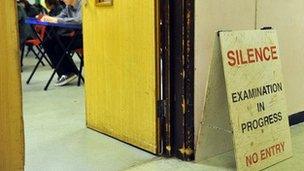EIS union calls for delay to new curriculum exams
- Published

The new National exam will replace Standard Grades and Intermediates
Schools should be allowed to delay a new exam system if they are not ready to implement it, Scotland's largest teaching union has said.
The Educational Institute of Scotland (EIS) believes the one-step move to Nationals is "fraught with danger".
The new exams are linked to the Curriculum for Excellence framework.
Scotland's Education Secretary Mike Russell said he wanted uniform implementation of the new exams but he has arranged to speak to the EIS.
Mr Russell has insisted that quality body Education Scotland would ensure a smooth transition to the new Curriculum for Excellence (CfE) exams.
The EIS plea follows moves by East Renfrewshire Council, Scotland's most successful education authority, to delay the exams for a year to allow more time to prepare.
The Scottish government's exam agency, the Scottish Qualifications Authority, has not yet revealed the exams in detail.
'Big bang'
Larry Flanagan, education convener of the EIS, told BBC Scotland he could not understand why ministers were so fixated on delivering the change in a single move.
"The Scottish government seems fixated on sticking to this timeline with almost everyone moving to the new exams at the same time," he said.
"They're determined to go for a really big bang - and that's exactly what they'll get - a big bang.
"Many schools feel they need an extra year to get their heads round the curriculum for excellence and Nationals, the new exams.
"It would be safer for them to wait. Why put pupils' exam results at risk in order to stick to a fixed timeline?"
Mr Russell told BBC Radio Scotland's Good Morning Scotland programme: "The cohort that is in S2 in the second year of secondary now has been on Curriculum for Excellence through primary and now in first and second year.
"It would be tremendously disruptive to change that at this stage, for a timetable that is on track, is on time, and is supported by all the other organisations."
He added: "But I take the EIS' position seriously. Teachers are a very important part of this. I want to sit down and discuss it to see what we can do to help."
Mr Russell said he had arranged a meeting with the EIS for 9 February.
Teacher training
Earlier this week, East Renfrewshire Council, which records much higher numbers of exam passes than any other area in Scotland, said more time was needed to train teachers for the new courses.
Under Scottish government plans, pupils in the second year of secondary school are to be the first to sit the National exams in 2014. They will replace Standard Grades and Intermediates.
Labour's education spokesman Hugh Henry said the Scottish government's plans for the Curriculum for Excellence were "unravelling".
He said: "Mike Russell's promises are starting to sound hollow. He needs to give an absolute guarantee that the resources are in place and that teachers across Scotland are ready for the introduction of CfE."
Scottish Liberal Democrat education spokesman Liam McArthur said Curriculum for Excellence was the right approach for Scotland to be taking.
"However, the announcement that East Renfrewshire Council wishes to delay implementation of the new curriculum exams is very worrying," he said.
"To-date, the education secretary has insisted that any problems with the curriculum were minor and localised. It would appear that the minister may have underestimated the extent and seriousness of the difficulties."
Liz Smith, the Scottish Conservative education spokeswoman, said the SNP must act urgently to address the concerns of the many schools which feel they are not fully prepared for the change.
She said: "It is the Scottish government which is responsible for the fact that there has been far too long a gap between the development of Curriculum for Excellence courses and the publication of the details of the new exams.
"Teachers are understandably anxious that they have spent several years planning new courses without having much idea of the exam formats."
She added: "It is perfectly possible to have a short overlap period while the old and new exams are both available. This is something that has happened in the past and it should happen now."
- Published1 February 2012
- Published31 January 2012
- Published5 January 2012
- Published19 December 2011
- Published7 December 2011
- Published28 September 2011